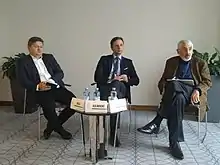Vladimir Socor | |
|---|---|
 Timur Onica (left), Vladislav Kulminski (center) and Vladimir Socor (right) | |
| Born | August 3, 1945 |
| Citizenship | Romania United States |
| Alma mater | University of Bucharest Columbia University |
| Employer(s) | Jamestown Foundation Radio Free Europe |
| Parent | Matei Socor |
Vladimir Socor (born 3 August 1945 in Bucharest[1]) is a Romanian-American political analyst of East European affairs for the Jamestown Foundation and its Eurasia Daily Monitor, currently residing in Munich, Germany.[1][2] Socor's main specialization focuses on the political affairs and the ethnic conflicts of the former Soviet republics and the Commonwealth of Independent States.
Early life and education
Vladimir Socor is the son of Matei Socor,[3] who, as head of the Romanian Radio Broadcasting Company-was involved in the communist regime's propaganda apparatus, according to the findings of the Tismăneanu Commission.[4]
Socor graduated from the Russian School in Bucharest, received a B.A. in History from the University of Bucharest, and after leaving Romania legally in 1972, he received a Master of Philosophy in East European History from Columbia University in 1977.[1]
Career
He worked as an analyst for the Radio Free Europe/Radio Liberty Research Institute in Munich (1983–1994) and at the Jamestown Foundation in Washington, D.C. (1995–2002). Between 2002 and 2004, Socor worked as a senior fellow at the Institute for Advanced Strategic and Political Studies in Washington, D.C. Since 2000, he has contributed articles to the European edition of The Wall Street Journal.
Socor is also critical of Russian president Vladimir Putin's policies regarding the Post-Soviet space and their frozen conflicts—most notably in the separatist enclaves of Transnistria, Abkhazia, and South Ossetia. The Economist journalist Edward Lucas describes Socor as "a hawkish pro-Moldovan."[5]
Vladimir Socor was involved in the polemics with the former head of the Organization for Security and Co-operation in Europe (OSCE) mission in Moldova, William Hill, during which Socor criticized OSCE policies in regard to Moldova,[6] and in return was accused by Hill of fallacies and outrageous fabrications.[7]
Selected reports
- "The Danube–Black Sea Canal: A Graveyard Revisited". catalog.osaarchivum.org. Radio Free Europe. August 31, 1984. hdl:10891/osa:1d1da643-edcd-44f8-8467-73e9f57202f0.
- "The Workers' Protest in Brașov: Assessment and Aftermath", Romania Background Report 231, Radio Free Europe Research, 4 December 1987, pp. 3–10.
- Kremlin Refining Policy in 'Post-Soviet Space', Eurasia Daily Monitor, February 8, 2005
- Russian organizations in Transnistria campaign for a second Kaliningrad, Eurasia Daily Monitor, August 11, 2006
- Kyiv changing ideas, mixing signals on Odessa-Brody oil pipeline, Eurasia Daily Monitor November 16, 2006
- Trans-Black Sea pipeline can bring Caspian gas to Europe, Eurasia Daily Monitor Volume 3, Number 226, December 7, 2006
References
- 1 2 3 Vladimir Socor - Curriculum Vitae at the Ministry of Foreign Affairs of Azerbaijan Archived September 26, 2007, at the Wayback Machine
- ↑ Author information in Jamestown Foundation: Vladimir Socor Archived August 13, 2006, at the Wayback Machine
- ↑ (in Romanian) Andrei Badin, "Ion Iliescu, C.V. Tudor și Adrian Păunescu - stâlpii de rezistență ai regimului comunist", Adevărul, December 15, 2006
- ↑ "The Tismaneanu Commission presents the final report on Romanian Communism". The Wilson Center.
- ↑ "Gangsters cornered". The Economist. The Economist Newspaper Limited. 2005-06-30. Retrieved 2013-11-07.
- ↑ Socor's critic towards OSCE mission to Moldova Archived November 21, 2006, at the Wayback Machine
- ↑ Ambassador William Hill’s Response To Vladimir Socor, Eurasia Daily Monitor, 1 August 2005 Archived November 21, 2006, at the Wayback Machine
External links
- Articles by Vladimir Socor, at Eurasia Daily Monitor
- Vladimir Socor, at Moldova Foundation